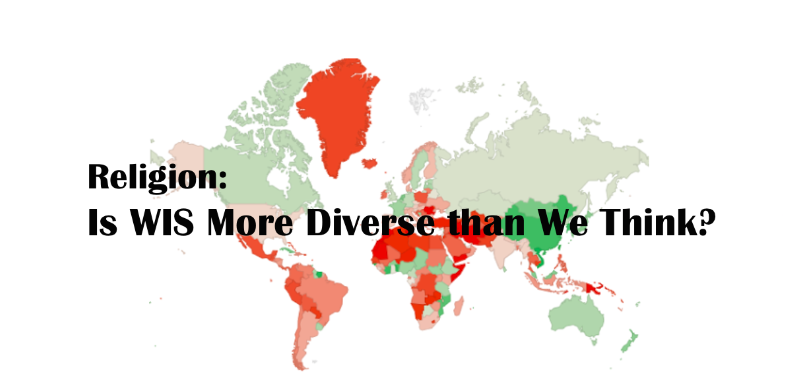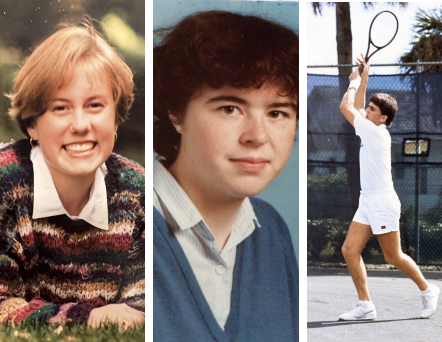The Washington International School’s mission statement is “to provide a demanding international education that will challenge students to become responsible and effective world citizens.” WIS.edu then defines world/global citizenship saying, “Washington International School believes that global citizenship requires engagement with diverse cultural perspectives”. While WIS may strive for diverse cultural perspectives, to what extent does the school really fulfill that element of its mission?
Religion is a key element of culture and of anthropology as a whole, and therefore serves as a critical component of the cultural diversity that the school aims for. While it is often easy to determine that many nationalities are represented in the WIS community, it is harder to measure religious diversity as religion as a whole is a touchy subject in this country as it evokes so many major socio-political areas of debate.
Recently, the International Dateline conducted a survey to examine and discover how WIS students and faculty members at Tregaron view religious diversity here.
The survey obtained 207 responses over the course of 30 days from WIS students grades 7 through 12 as well as Tregaron faculty and administrators. The results, given that over 40% of those asked responded, at the least provide a window into the overall perception of religion within the community.

Accompanying this survey was the question about which religion respondents affiliate with. The question was presented as a multiple choice in which the world’s most common religions were assigned a checkbox 1. This pie chart shows how the pool of respondents answered the question. The graph shows that the largest groups of religious identification at the school are Roman Catholicism and Atheism. There were some smaller but still significant groups as well: “Don’t know/rather not say”, “Other” and “Protestantism (Mainline or Evangelical)”. At first sight, it would appear that some groups are significantly larger in population than others, but this does not necessarily provide insight into the actual diversity of the school’s population.
Now how does this compare to the United States a whole? This bar chart puts the two in comparison:2
Visually, it is clear that WIS has a far more balanced representation of various religious beliefs than the United States, a country that ranks in the middle of the global ranking for religious diversity, so it can be assumed that WIS is more religiously diverse than the United States. But how does WIS compare to the most religiously diverse country in the World, Singapore? Singapore obtained a ratio 9.0/10.0 (versus the US’ 4.1/10.0) on the Religious Diversity Index. The differences between WIS and the most religiously diverse country are present in the chart attached to the link here. And while Singapore is a very religiously diverse country, its chart looks vaguely similar to WIS’. Both have a single group that towers over the others in terms of the makeup of the overall population it represents (in WIS’ case, Christians, in Singapore’s case, Buddhists). To find exactly how religiously diverse WIS is, the community must be treated like a country so that the methodology applied to calculate religious diversity may be applied for WIS. This methodology, provided by the Pew Research Center, shows that were WIS a country, it would rank No. 1 in the World for most religiously diverse, in front Singapore and Taiwan, Vietnam, Suriname and Guinea-Bissau. WIS is an extremely religiously diverse community.
The results surprised some people (To compare WIS to countries, look at this map of RDI in the World). For example, one junior who believed Atheists were a majority at Tregaron explained, “A lot of people I know relate to atheism as well, and I think as time goes on, atheism is becoming more popular.” And while Atheists represent a significant minority, they represent a smaller group of people than Catholics.

While the school is extremely religiously diverse and students may experience others’ cultures on a daily basis, nearly half of all respondents do not believe their peers fully respect their religious beliefs as this chart shows. Only half of respondents (50.8%) said that they felt ‘very much so’ respected by their peers for their religious beliefs.
In a school that strives for global citizenry, there appears to be a problem in how people perceive the way some treat other’s religions. One junior claimed in the survey’s extra comment box,“There is that awkward moment when someone speaks of their religious affiliation.” There is also a “social stigma around religious beliefs when it is brought up in class. When someone talks of their religious affiliation, it may be accompanied by a sort of silence.”
This student is clearly not alone in believing that religion is quite a sensitive topic, as only half of respondents claim that they feel completely satisfied with their peers’ respect for their own personal religious beliefs. Most of the rest of the student body belongs in a group that feels they are mostly respected while a small minority feels outright disrespected.
While some students don’t feel completely respected,most feel completely satisfied with the community. In regard to the matter, one 8th grader who identifies himself as a Sunni Muslim said “I haven’t [been discriminated against]. I’ve been fine with people understanding my beliefs and practices. I haven’t been discriminated by anyone here.” He also added, “I feel welcome too because there are people just like me who might not be Christians and aren’t American.”
While he described the environment as safe and welcoming, he did add a shortcoming to the community’s respect for his beliefs, saying “they do often make jokes about how I can’t eat pork and other jokes, but I know they don’t mean it in a serious, mean way.”
This joking appears to also be a recurring theme. In the survey, respondents commented, “People can demonstrate prejudice against the Catholic Church at times. There are stereotypes,” or “People joke about religion a lot”. While the school cannot be at fault for individual students’ behavior, there appears to be a culture [regardless of how small] in which the idea that making fun of one’s religious beliefs is ‘OK’.
The aforementioned 8th grade student also believes that, “it would be nice if WIS let us Muslims treat Eid as a holiday instead of me missing school and having to be excused.” This student speaks of something mentioned many times as an additional comment in the survey, as another respondent commented “I feel like we focus more on Christian holidays and disregard the others.”
What is most surprising as a finding from the survey is overwhelming lack of belief in the school’s total diverse nature. When asked if the school’s community is religiously diverse, only 18% of respondents said the school is ‘Greatly’ to the question (the other 82% mostly said they believe the school to be mostly or adequately diverse, a small minority reported dissatisfaction) “To what extent do you think WIS is religiously diverse?” This information is surprising if not troubling because while the school is exceptionally diverse, but the understanding within the community is that this is not the case. Why this is the case is an unknown, but perhaps the lack of understanding of others and the jokes and attitude toward religion displayed within the community would dissuade the average respondent from ticking that ‘Greatly’ box. This small minority that said ‘Greatly’ was on the right track, subconsciously or not as the information earlier expressed shows that WIS is hugely diverse.
So when answering the question, “Does the school fulfill its mission to create global citizenry?” the answer would be most likely ‘Yes’. While in reality a truly diverse community thrives within the space of 3100 Macomb Street, that same community doubts its own diversity, perhaps revealing its true character as a thoughtful, self-assessing one.
By Henri-Nicolas Grossman
1. Although Shinto beliefs practiced mainly in Japan represent over 100 million followers, Shinto was not an option as it is not considered a religion but rather a way of life, much like Confucianism.
2. Table adjusted so that when write-ins would have qualified a person as a Protestant, they are classified as one in the table versus in the ‘Other’ section.

































































